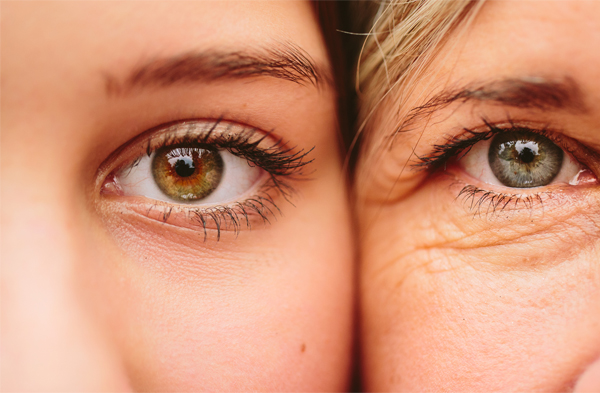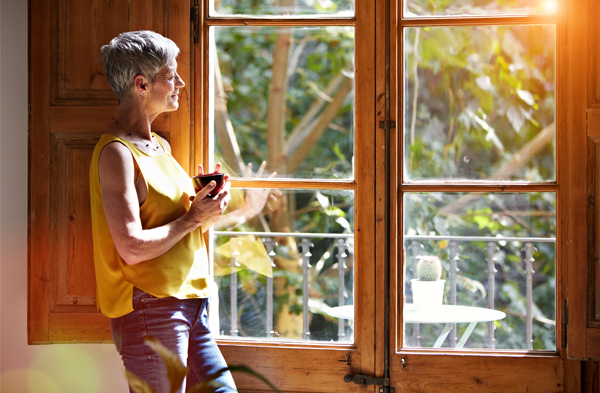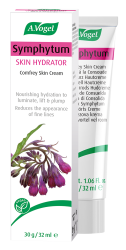An introduction to ageing skin
Ageing in a natural biological process that will inevitably take a toll on your skin, no matter what lotions and potions you use. This is because your body is genetically programmed to age in a certain way – as you get older we will lose important proteins and enzymes and become more vulnerable to the effects of oxidative stress, which can damage your DNA.
However, it’s not all doom and gloom. Yes, ageing is an unavoidable aspect of being human but how quickly you age can depend on your body’s ability to combat this oxidative stress and repair damaged cells, which is where your diet and lifestyle come into the forefront, especially when you consider extrinsic ageing.
What is extrinsic ageing?
Extrinsic ageing is probably better known as ‘premature ageing.’ While intrinsic ageing, or chronological ageing, is determined by internal physiological factors and is largely unavoidable, extrinsic ageing is completely preventable and largely caused by external factors such as your stress levels, diet, lifestyle and environmental issues like the weather. Premature ageing also accounts for the majority of physical ageing symptoms, including the ones that manifest on your skin, such as wrinkles, fine lines and sagging.
What happens to our skin as we age?

Your skin loses collagen - Intrinsic ageing will influence your body as early as your 20s although you may not notice the impact for several decades. Starting here, your production of collagen, a key structural protein, will gradually slow down, with 1% less collagen being produced each year. As you get into your 40s, women may also experience lower levels of oestrogen which can exacerbate this process. By this point, you will start to notice this loss in collagen as the physical symptoms become more evident – sagging, loss of elasticity and wrinkles!
Your production of sebum oil slows down: It isn’t just your production of collagen that can age your skin – your sebaceous glands will also start to produce less sebum oil. Now if you suffer from acne this may sound like a blessing but your skin needs sebum oil to stay lubricated and without it, your skin can become noticeably drier. If you already suffer from a dry skin condition like eczema, you may experience more flare-ups as a result of this particular factor.
Your blood vessels become weaker: You may also have noticed that as you age your skin appears thinner and you’re more susceptible to bruises. While collagen and a loss of fatty tissues can play a role, the blood vessels in your dermal layer of skin can also become delicate and more prone to bleeding which can affect your ability to heal and sometimes cause rosacea flare-ups.
Your skin looks duller: When it comes to your complexion and overall skin tone, you are largely dependent on melanocytes. These cells help to produce melanin, a pigment which gives colour to your hair and skin and determines your overall skin tone – those that have darker skin generally produce more melanin while those that have fairer skin do not produce as much. Unfortunately, as you age your number of melanocytes will diminish which can affect the overall tone of your skin and sometimes cause age spots to manifest
So, as you age hormonal changes and physiological factors can take a toll but as I mentioned earlier, you don’t have to give in to despair. Yes, some intrinsic parts of ageing are unavoidable but you also have to consider the role that extrinsic ageing plays in these visible processes and your ability to combat oxidative stress and free radical damage.
Can natural remedies help?

As I mentioned earlier, you can’t cure ageing naturally or otherwise but you can certainly grow old gracefully and prevent your skin from ageing prematurely. In this case, it’s not so much natural remedies that you need to focus on straight away but rather aspects of your diet and overall lifestyle, although as I shall discuss, nourishing your skin with hydrating, nutrient-rich creams can certainly help!
Below I’ve listed just a few suggestions for steps you can take to prevent premature ageing and support your skin during this time. However, if you want a bit more information about the type of habits to avoid, I’d recommend checking out my blog ‘6 habits that are prematurely ageing your skin.’
- Get as many antioxidants as possible: Antioxidants are substances that are found in your food that can work to counteract the free-radical damage responsible for premature ageing so it’s always worthwhile trying to get as many antioxidant-rich foods into your diet as possible. Blueberries, raspberries, avocados, goji berries, kale, spinach and other brightly coloured fruits and vegetables are excellent sources of antioxidants as well as other skin-boosting vitamins and minerals like zinc, magnesium and vitamin D! If you want to want to learn more about the types of food you should be eating, please take a look at my blog ‘The best foods for ageing skin’
- Stop smoking: Smoking is terrible for your overall health for multiple reasons but it can also age your skin. In fact, smoking is thought to be one of the biggest causes of wrinkles as the nicotine in cigarettes can inhibit the flow of blood to your skin, preventing your skin from getting the nutrients it needs and damaging key structural proteins like collagen.1 You can find more information about quitting smoking here - https://www.nhs.uk/smokefree
- Drink plenty of water: Did you know that human beings can go weeks without food but only survive a few days without water? That alone should speak volumes about the importance of getting plenty of H20 but most of us would prefer to trade in a glass of still water for a cup of tea or coffee. Unfortunately, these drinks have little to offer in terms of hydration and can actually cause you to lose fluids, which is definitely not good news for your skin!
- Get some exercise: Exercise is fantastic for boosting your mood, keeping you active and stimulating your circulatory system, ensuring that plenty of oxygenated blood is reaching your skin. You don’t have to do a lot – even a brisk 10 minute walk each day can help and you can always check out our Get Active hub for more ideas about the types of exercise that are suitable for you
- Consider your cosmetics: If you start to see fine lines appearing around your eyes, your first instinct might be to slap on some anti-ageing cream followed by a heavy layer of concealer and foundation. However, most conventional creams, lotions and cosmetics are riddled with harsh chemicals that can actually damage your skin and cause irritation. That’s why I’d recommend taking a natural approach when it comes to your skincare – the fewer ingredients, the better! If you’re looking for a natural moisturising cream, you could try our own Comfrey Cream which can help to ease the appearance of fine lines, invigorating your skin with new life and brightening your natural complexion.
1https://www.mayoclinic.org/healthy-lifestyle/quit-smoking/expert-answers/smoking/faq-20058153








